The Role of Early Intervention in Managing Aggressive Behaviors
Unlocking the Power of Early Action to Curb Childhood Aggression
Table of Contents
Understanding the Foundation of Early Intervention
Early intervention plays a crucial role in shaping the developmental trajectories of children exhibiting aggressive behaviors. By identifying at-risk behaviors and implementing targeted, evidence-based strategies during formative years, families and professionals can significantly alter the course of a child's emotional and behavioral development. This proactive approach not only prevents the escalation of aggression but also promotes resilience, social competence, and mental well-being, thus laying the groundwork for healthier adulthood.
The Importance of Early Intervention in Childhood Behavioral Management
Why is early intervention crucial in managing aggressive behaviors in children?
Early intervention plays a significant role in shaping a child's developmental trajectory, especially when it comes to managing behaviors like aggression and irritability. Addressing these issues during infancy or preschool can prevent them from becoming ingrained, more severe problems as children grow older.
Research shows that timely support helps identify specific triggers, teach emotional regulation, and strengthen social skills before problematic behaviors escalate. For example, programs such as Parent Management Training (PMT) teach parents how to reinforce positive behaviors and use consistent consequences, reducing disruptive conduct.
Cognitive-behavioral therapy (CBT) adapts well for early use, focusing on emotion regulation strategies like deep breathing and cognitive reframing. Interventions like these, when introduced early, encourage healthier peer relationships, improve family dynamics, and foster emotional resilience.
Benefits of intervention during infancy and preschool
Implementing targeted programs in these formative years offers numerous benefits:
- Prevents the development of long-term behavioral problems such as violence, defiance, and antisocial tendencies.
- Supports emotional, social, and cognitive growth by teaching coping skills, promoting positive interactions, and providing a secure environment.
- Facilitates early recognition of risks such as maternal depression or emotional unavailability, which are linked to higher aggression in children.
- Enhances family functioning and empowers parents to foster nurturing and consistent discipline.
One notable example is the Infant Behavior Program (IBP), a brief, in-home adaptation of Parent-Child Interaction Therapy. It has proven effective in decreasing aggressive behaviors in infants aged 12 to 15 months by reducing negative parenting practices like directive and negative statements.
Impact on development and society
Early intervention not only benefits individual children but also reduces future societal costs associated with untreated behavioral problems. It improves skills that are vital for lifelong success—like emotional regulation, problem-solving, and social competence.
By fostering healthier behaviors early on, intervention can decrease the likelihood of mental health issues, improve academic outcomes, and promote better relationships within families and communities.
In summary
Addressing aggressive behaviors early allows for tailored, developmentally appropriate strategies that shape positive habits and prevent long-term difficulties. Programs that integrate family participation, evidence-based techniques, and early diagnosis hold the potential to support children in becoming well-adjusted, resilient adults.
Evidence-Based Strategies and Techniques in Early Childhood Aggression Intervention
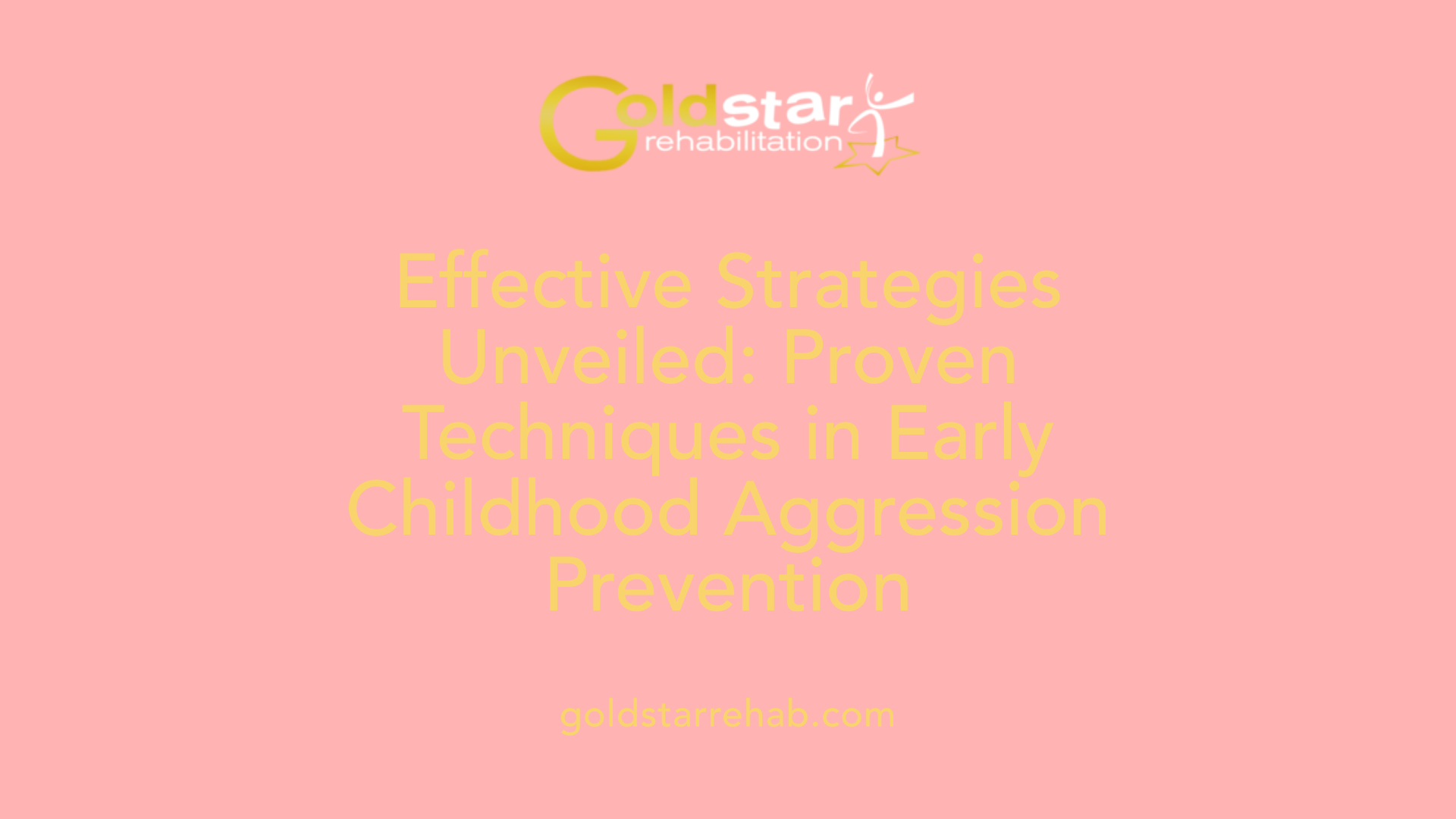
What are evidence-based methods and strategies for early intervention for aggression in children?
Implementing effective early interventions for aggressive behaviors in children relies on scientifically supported methods that address underlying emotional, behavioral, and environmental factors. Parent Management Training (PMT) is one such evidence-based approach, with models like the Oregon model and the Triple P Program. These methods emphasize improving family interactions using operant conditioning principles such as praise for positive behaviors and consistent consequences for misbehavior. Randomized controlled trials have consistently shown PMT’s effectiveness in reducing disruptive behaviors.
Alongside PMT, cognitive-behavioral therapy (CBT) tailored for children plays a vital role. These approaches target deficits in emotion regulation and social problem-solving skills. Techniques such as antecedent analysis, relaxation training, cognitive reappraisal, and social skills development help children recognize triggers and adopt healthier responses. Transdiagnostic CBT approaches, which address anger, irritability, and aggression across various diagnoses, have shown promising results.
School-based social-emotional learning programs are also integral. Programs like PATHS (Promoting Alternative Thinking Strategies) and the Incredible Years create structured environments that foster emotional regulation, empathy, and positive behaviors. These programs often involve both children and parents, ensuring consistent reinforcement across settings.
Early assessment and treatment of primary disorders, such as ADHD and autism spectrum disorder, are crucial. These often involve combined behavioral therapy and medication, tailored to individual needs, which can significantly reduce aggressive incidents.
Overall, effective early intervention is multimodal, combining parent training, child-focused therapy, school programs, and disorder management. Such comprehensive strategies promote emotional regulation, problem-solving, and positive reinforcement, laying a foundation for healthier long-term behavioral patterns.
| Strategy Type | Key Features | Supporting Evidence |
|---|---|---|
| Parent Management Training (PMT) | Focuses on improving family interactions, praise, consequences | Strong empirical support through randomized controlled trials |
| Cognitive-Behavioral Therapy (CBT) | Targets emotion regulation, social skills, triggers | Effective across various diagnoses, promoting emotional control |
| School-based Programs | SEL curricula like PATHS, Incredible Years, involve parent training | Improve social skills, reduce aggression in structured settings |
| Primary Disorder Treatment | Combines behavioral therapy and medication, if needed | Addresses root causes, enhances overall behavioral outcomes |
In summary, integrating these evidence-based methods early in childhood can significantly reduce aggression, support emotional development, and prevent escalation into more severe behavioral issues.
Psychosocial Treatments: Parent Management Training and Cognitive-Behavioral Therapy
How do psychosocial treatments like parent management training and cognitive-behavioral therapy help in early intervention for aggression?
Psychosocial strategies such as Parent Management Training (PMT) and Cognitive-Behavioral Therapy (CBT) play a crucial role in early intervention for aggressive behaviors in children. These approaches focus on addressing the root causes of aggression—whether behavioral patterns or emotional regulation difficulties—and involve active participation from parents, children, and often, the wider family.
PMT helps parents learn effective ways to manage their child's behavior by teaching skills that reinforce positive conduct and reduce oppositional or aggressive responses. It emphasizes consistent discipline, giving praise for appropriate behavior, and ignoring minor misbehaviors, which collectively help in shaping better behaviors over time. Studies have shown that children in families receiving PMT exhibit significant reductions in disruptive acts, including anger and aggression.
CBT, on the other hand, targets the child's thought processes and emotional responses that contribute to aggression. It guides children to identify specific triggers—such as frustration or social conflicts—develop coping mechanisms like calming techniques, and learn social skills to navigate conflicts more healthily. For children with severe irritability, adaptations of CBT, like dialectical behavior therapy (DBT), have demonstrated promising results by focusing on emotional regulation.
These treatments are validated by extensive research, including randomized controlled trials, confirming their effectiveness. They are particularly useful in outpatient settings but can also be tailored for severe cases. For example, integrating technology-based tools and continuous assessment through measurement-based care helps maintain treatment progress and adapt strategies as needed.
In summary, early psychosocial interventions like PMT and CBT are tailored, evidence-based methods that teach children and families skills to mitigate aggressive behaviors proactively, fostering healthier social interactions and emotional regulation from an early age.
Impact of Early Intervention on Emotional and Behavioral Development
What impact does early intervention have on the emotional and behavioral development of children with aggressive behaviors?
Early intervention is vital in shaping healthy emotional and behavioral growth in children exhibiting aggressive tendencies. It focuses on teaching children emotional regulation skills, improving social interactions, and preventing problematic behaviors from becoming entrenched.
Programs like the Incredible Years® (IY) and family-centered strategies such as the Family Check-Up demonstrate effectiveness in converting children from maladaptive to normative behavioral profiles. These programs emphasize understanding individual risk factors and nurturing protective factors, primarily through parent training and active involvement of caregivers.
Research shows that early interventions can significantly reduce aggressive behaviors and associated internalizing problems like anxiety and depression. For example, brief parenting interventions targeting negative parenting practices—such as reducing directive and controlling 'don’t skills'—have led to observable declines in infants' aggressive behaviors in the short term.
Furthermore, early action helps prevent the escalation of mental health disorders into adolescence or adulthood. It decreases the likelihood of developing substance abuse, self-injurious behaviors, or persistent emotional difficulties.
Addressing emotional and behavioral issues early promotes better social skills, leading to improved peer and family relationships. It also supports cognitive development and fosters resilience—the ability to adapt positively despite challenges.
From a broader perspective, investing in early intervention offers long-term benefits not only to the child's development but also to society by reducing future mental health treatment costs. Children who receive timely support are more likely to grow into well-adjusted adults capable of healthy relationships and employment.
In summary, early intervention enhances emotional regulation, fosters social competence, prevents long-term psychiatric issues, and strengthens resilience, paving the way for healthier life trajectories.
| Effect | Description | Supporting Evidence |
|---|---|---|
| Emotional regulation | Children learn to manage feelings like anger and frustration more effectively | Studies show increased emotion regulation skills post-intervention |
| Social skills improvement | Better peer interactions and family relationships | Programs like IY report improved social functioning |
| Prevention of mental health issues | Reduced risk of disorders such as anxiety, depression, or conduct problems | Randomized trials demonstrate decreased behavioral problems |
| Resilience and well-being | Enhanced capacity to cope with stress and challenges | Development of coping mechanisms like mindfulness and relaxation |
The cumulative evidence underscores that early intervention yields substantial benefits in emotional resilience and behavioral stability, ultimately leading to healthier development into adulthood.
Research Evidence Supporting Early Childhood Intervention Programs
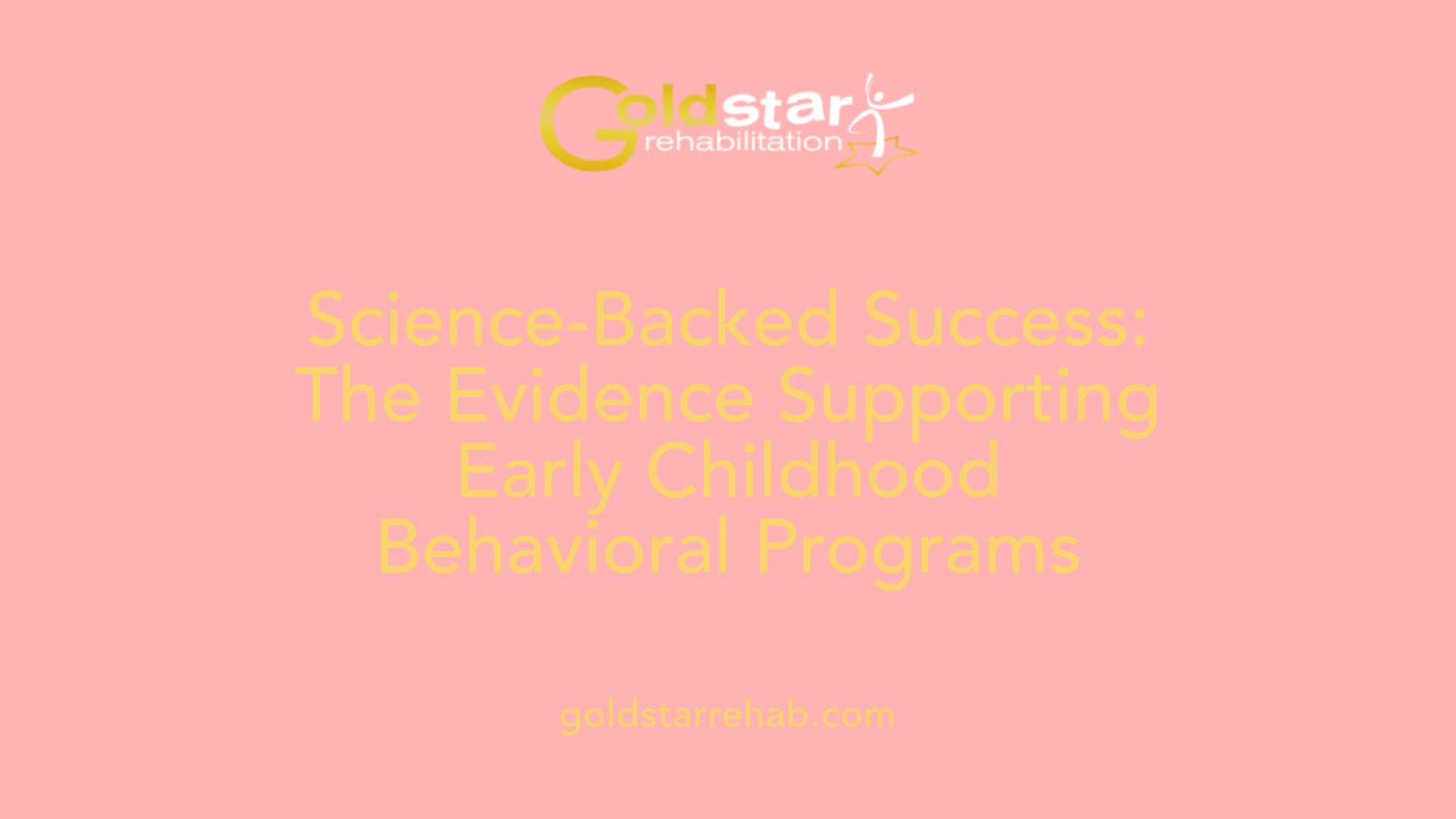
What is known about the effectiveness of early intervention programs in reducing aggressive behaviors in children?
Research shows that early intervention programs can significantly decrease aggressive behaviors in children. Both broad, school-wide initiatives and targeted family-centered therapies have demonstrated positive effects.
School-based programs, particularly those grounded in evidence-based theories and implemented through structured methods like randomized controlled trials (RCTs), have produced measurable reductions in aggression. For example, universal programs often result in effect sizes around 0.21, indicating modest but meaningful improvements. More targeted interventions, aimed at children at higher risk, tend to have slightly larger impacts, with effect sizes near 0.29.
Family-focused therapies also play a crucial role. Initiatives such as Parent-Child Interaction Therapy and parent training programs show large, enduring benefits. These interventions not only decrease youth-to-parent violence and aggressive outbursts but also improve overall family dynamics and social skills.
In addition, programs like the Incredible Years (IY) have demonstrated strong evidence of effectiveness. They involve parents, teachers, and children working together to strengthen emotional regulation and positive behavior. Randomized controlled trial data support their capacity to promote healthy developmental trajectories.
Early intervention that addresses behavioral and emotional issues early on can prevent the escalation of problems. For example, studies of such programs show sustained reduction in oppositional behaviors over months, sometimes years.
Some notable findings include:
- Decreases in aggressive and oppositional behaviors in children participating in targeted classroom or home-based programs.
- Significant improvements in social-emotional skills, which are linked to reduced aggression.
- Long-term positive effects on family relationships, mental health symptoms, and youth conduct.
In sum, the extensive empirical evidence confirms that early intervention programs are a powerful tool to mitigate aggression, improve social functioning, and foster healthier developmental outcomes in children.
Long-term Outcomes and Developmental Impact of Early Intervention
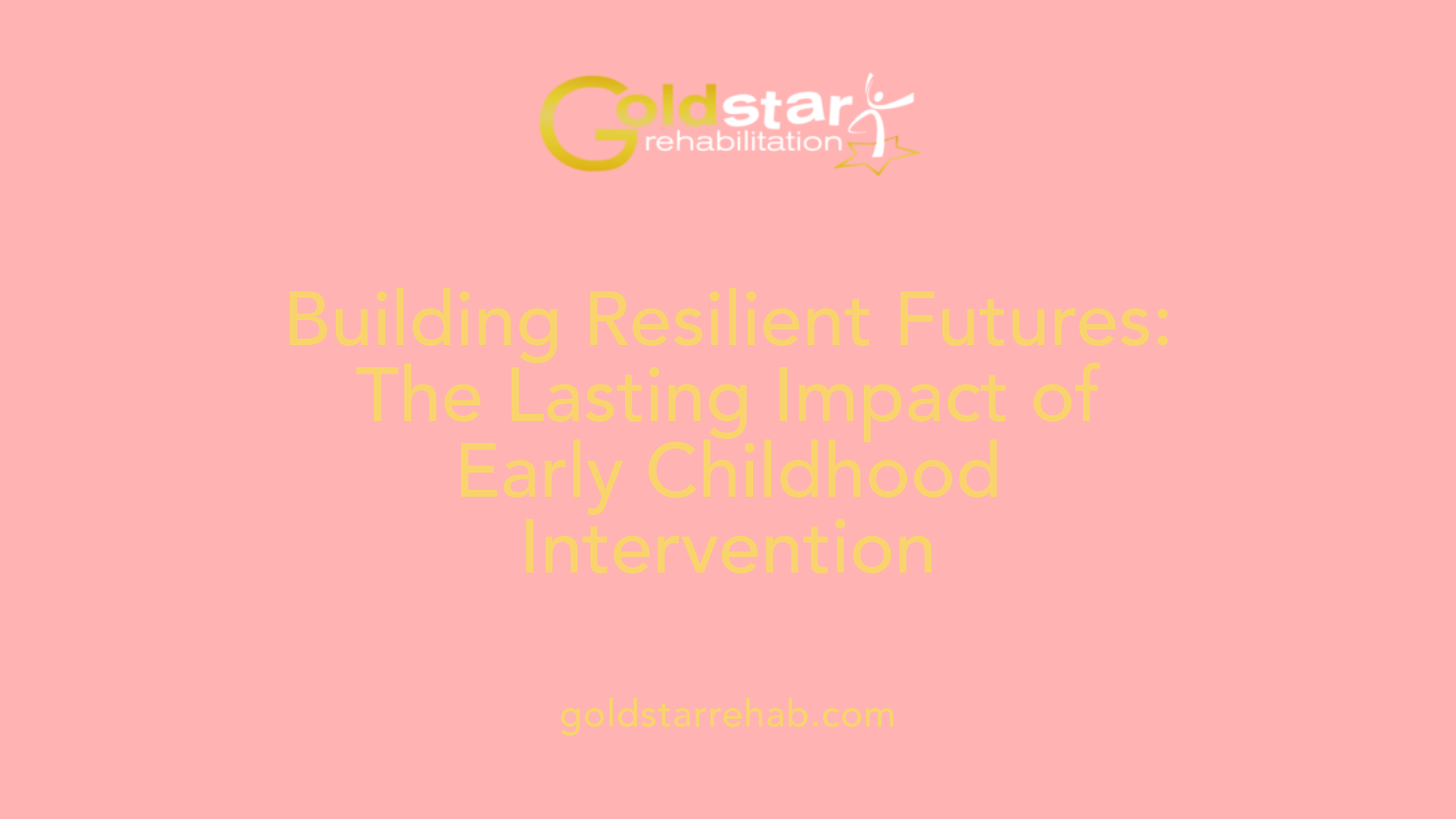
How does early intervention influence long-term behavioral outcomes and development?
Early intervention plays a crucial role in shaping a child's future by fostering essential skills emotional regulation, social competence, and cognitive development during sensitive developmental periods. Evidence from programs like the Chicago Child-Parent Center highlights that the positive effects of high-quality early childhood interventions can be durable, influencing behavior, academic success, and health well into adulthood.
Research shows that children who receive early support are less likely to develop antisocial behaviors, engage in delinquency, or display aggressive tendencies later in life. For example, early cognitive-behavioral approaches reduce aggression by teaching children how to recognize triggers and adopt positive coping strategies.
However, the long-lasting impact varies depending on several factors. Some behavioral improvements, such as reduced aggression, tend to persist if ongoing support or reinforcement continues. Conversely, other issues like behavioral problems can sometimes diminish over time, especially with additional interventions or stable environmental factors.
Mediating factors significantly influence long-term outcomes. Family environment, parental support, and quality of education are critical in maintaining and extending initial gains. For instance, a nurturing home environment can reinforce positive behaviors learned during early intervention, while poor educational settings might hinder progress.
Gender differences may also influence how children benefit from early interventions. Some studies suggest that males and females might respond differently to specific strategies, affecting long-term success.
Overall, early interventions provide a foundation that helps prevent future behavioral issues, promotes school readiness, and contributes to healthier, more resilient adults. Ongoing support, coupled with favorable family and educational environments, is vital to sustain these long-term benefits.
Mechanisms and Processes Underpinning Early Intervention Success
What mechanisms and processes are involved in effective early intervention for aggression?
Effective early intervention for aggression relies on a combination of strategies that target both individual behaviors and environmental influences. One crucial mechanism is the development of social-emotional skills, which helps children learn to regulate their emotions, understand social cues, and solve problems constructively. Programs like PATHS (Promoting Alternative Thinking Strategies) and REDI (Research-based, Developmentally Informed interventions) have demonstrated success in fostering these skills.
Simultaneously, parent management training, such as Incredible Years and Parent-Child Interaction Therapy, aims to modify family interaction patterns. By teaching parents how to give positive reinforcement, communicate effectively, and set consistent boundaries, these programs reduce triggers for aggression and help establish a more nurturing home environment.
Cognitive-behavioral therapy (CBT) plays a vital role by directly addressing deficits in emotion regulation and social problem-solving. It helps children recognize and manage triggers, develop coping strategies like deep breathing and cognitive reframing, and challenges maladaptive thought patterns that decrease impulsivity and anger.
Interventions often focus on altering risk pathways such as impulsivity, insecure attachment, and dysfunctional family dynamics. Employing systemic and psycho-educational techniques, these approaches create a comprehensive support system that considers the child's broader social context.
In practice, successful programs typically combine classroom-based social-emotional curricula with family-centered strategies. The integration of these methods, backed by extensive empirical evidence, enhances overall intervention effectiveness.
By addressing multiple risk factors simultaneously, these approaches promote skill development, improve family interactions, and ultimately reduce aggressive behaviors. The synergistic effect of targeting individual, familial, and systemic factors underpins the success observed in early behavioral intervention programs.
The Role of Parenting Skills and Family Engagement in Early Intervention
Why are parenting skills and family-based approaches important in early intervention?
Parenting skills and family involvement play a pivotal role in early intervention for children's behavioral and developmental issues. Parents are the primary figures shaping a child's environment and behaviors, making their engagement essential for lasting change.
Effective early intervention recognizes that parents serve as the main agents of change. They influence a child's language, social skills, cognition, and emotional regulation through everyday interactions. When families actively participate in intervention programs, they are better positioned to understand their child's needs and to practice targeted strategies at home.
Family-based approaches allow professionals to tailor support based on each child's unique circumstances and home environment. This personalized approach ensures that interventions are relevant and practical, increasing the likelihood of sustained positive outcomes.
Moreover, involving families fosters a supportive atmosphere that improves parent-child relationships. It enables parents to reinforce positive behaviors, establish routines, and set consistent boundaries, all of which are crucial for developing healthy behavioral patterns.
Practicing new skills during daily routines, such as meal times or play, helps children generalize learning beyond clinical settings. This natural environment-based reinforcement ensures that progress is embedded in regular life, enhancing overall effectiveness.
Research supports that family involvement in early childhood programs like Incredible Years (IY) leads to significant improvements in children's behavior and emotional skills. When families are empowered with knowledge and strategies, children experience more comprehensive and enduring growth.
Creating consistent routines and boundaries within the family setting is also fundamental. Routines provide structure, reduce anxiety, and help children learn expectations, while clear rules promote understanding of acceptable behaviors.
In summary, integrating parenting skills and family engagement into early intervention creates a collaborative effort that promotes holistic development. It ensures strategies are practiced in everyday life, leading to better behavioral adjustments and emotional resilience in children.
| Aspect | Benefits | Additional Details |
|---|---|---|
| Parent involvement | Sustained behavioral improvements | Enhances understanding, motivation, and consistency |
| Routine creation | Predictability and security | Helps children learn expectations and manage anxiety |
| Boundary setting | Clear expectations | Reduces confusion and misbehavior |
| Family support | Emotional resilience | Strengthens relationships and promotes positive environment |
By fostering family involvement, early intervention becomes a continuous, home-based effort that supports children's development and well-being, forming the foundation for long-term success.
Professional Perspectives and Policy Implications
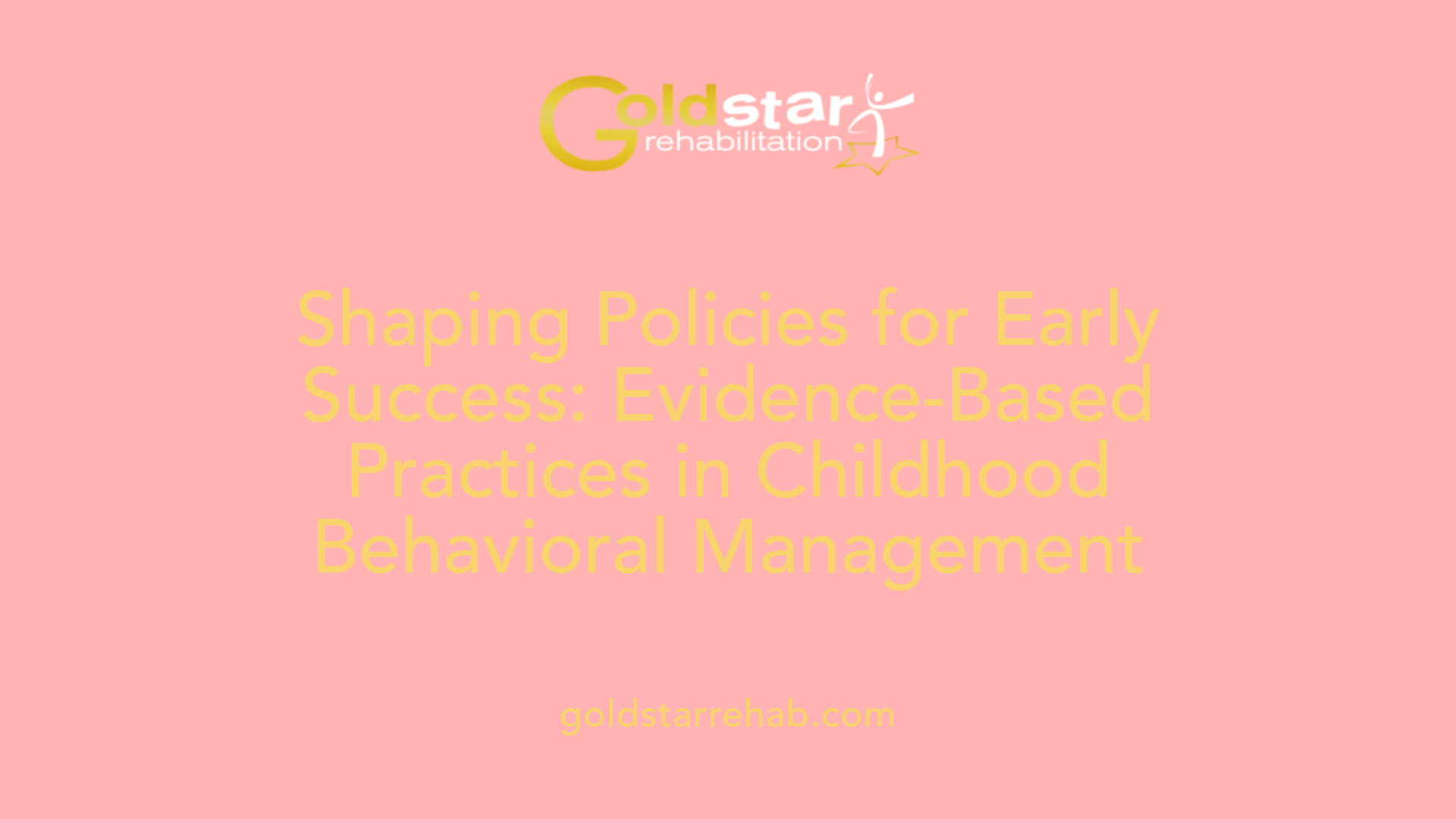
What are professional perspectives on early intervention strategies and their effectiveness?
Experts in child development and mental health widely agree that early intervention plays a vital role in preventing the persistence of aggressive behaviors and supporting positive growth in children. Extensive research shows that implementing behavioral therapies and parent training programs during early childhood can substantially reduce aggression and enhance social-emotional skills.
Programs like the Incredible Years and Parent-Child Interaction Therapy (PCIT) have been rigorously tested, demonstrating not only immediate improvements but also lasting benefits over time. These interventions help modify negative parenting styles, such as reducing directive or negative comments ('don’t skills'), which are linked to infant and child aggression.
Early interventions target critical developmental windows, particularly infancy and preschool years, when children are most receptive to learning new emotional regulation and social skills. By intervening during this period, practitioners can interrupt the developmental pathways often leading to chronic behavioral issues and social difficulties.
Many professionals emphasize that early intervention is more than a treatment—it is a preventive measure that can alter the trajectory of a child's behavioral and emotional development. This proactive approach supports healthier relationships, better mental health outcomes, and lifelong advantages.
Consensus among clinicians, educators, and policymakers underscores the importance of embedding early, evidence-based practices within child health and education systems. Providing comprehensive training to caregivers and professionals ensures these programs are delivered effectively, maximizing their impact.
Furthermore, there is agreement on the need for dedicated resources and funding to sustain early intervention initiatives. Investing in early childhood services not only improves individual outcomes but also reduces long-term societal costs associated with untreated behavioral problems.
What are the implications for integrating evidence-based practices into policy?
Policymakers are encouraged to adopt standards that prioritize early, scientifically supported interventions. This includes allocating funds for programs like PATHS, infant behavior programs, and family therapy, and integrating them into broader child health and education policies.
Building capacity through training professional staff equips them with the skills to implement these programs effectively. This includes training educators, mental health practitioners, and healthcare providers to recognize early signs of aggression and emotional difficulties.
Additionally, developing accessible, culturally responsive interventions ensures wider reach and effectiveness across diverse populations. Embedding these practices within existing service structures can foster sustainable improvements in child mental health and behavioral outcomes.
How should resource allocation and program funding be approached?
Efficient resource allocation should focus on evidence-based programs that demonstrate clear benefits in reducing aggression, improving social skills, and supporting families. Investment in early intervention not only benefits individual children but also decreases future expenditures related to juvenile justice, mental health treatment, and educational support.
Funding streams should support ongoing training, research, and program evaluation to adapt practices based on emerging evidence. Long-term financial investment is essential to establish a robust infrastructure that can deliver these critical services consistently.
By prioritizing early, effective intervention programs, policymakers can foster healthier developmental paths for children, ultimately creating more resilient communities.
| Aspect | Recommendations | Details |
|---|---|---|
| Professional training | Develop comprehensive training programs | For caregivers, teachers, and practitioners to implement evidence-based approaches effectively |
| Policy integration | Embed early intervention in national child health policies | Ensure programs are standard parts of child development strategies |
| Funding allocation | Allocate resources for proven programs | Support ongoing research, adaptation, and scaling of interventions |
| Program diversity | Use culturally responsive and adaptable models | Serve diverse populations with tailored strategies |
| Long-term planning | Invest in infrastructure | Support sustainability of early intervention services |
This collective approach aims to embed early intervention deeply within child health and educational systems, ensuring all children benefit from timely support that promotes healthier development and better life outcomes.
Addressing Youth-to-Parent Aggression through Early Intervention
How does early intervention help address youth-to-parent aggression and related clinical symptoms?
Early intervention plays a crucial role in managing youth-to-parent aggression and associated mental health issues. Programs like the Early Intervention Program in Situations of Youth-to-Parent Aggression (EI-YPA) focus on treating underlying behavioral problems by incorporating evidence-based techniques such as psycho-educational strategies, cognitive-behavioral therapy, and systemic family therapy.
Research involving families in Spain demonstrated that participating adolescents aged 12 to 17, along with their parents, experienced significant reductions in aggressive behaviors, clinical symptoms, and family conflict after completing the program.
Studies report large effect sizes — such as d=1.19 for aggressive discipline and d=0.93 for family conflict — indicating substantial improvements. These programs help children learn to manage anger, communicate more effectively, and regulate emotions, which decreases the probability of aggressive outbursts and escalation.
Moreover, early intervention fosters improved family relationships. By addressing behavioral issues before they become entrenched, mental health professionals can teach adolescents alternative ways to express frustrations, handle stress, and develop responsibility.
This proactive approach not only reduces immediate aggression but also contributes to safer home environments and healthier family dynamics over the long term. Structured protocols and ongoing assessments within these programs ensure that positive gains are maintained.
Overall, early intervention acts as a preventive measure, reducing future risks of violence, psychological distress, and relational conflicts, ultimately supporting adolescents in developing better social and emotional skills for adulthood.
Conclusion: Building a Safer Future through Early Action
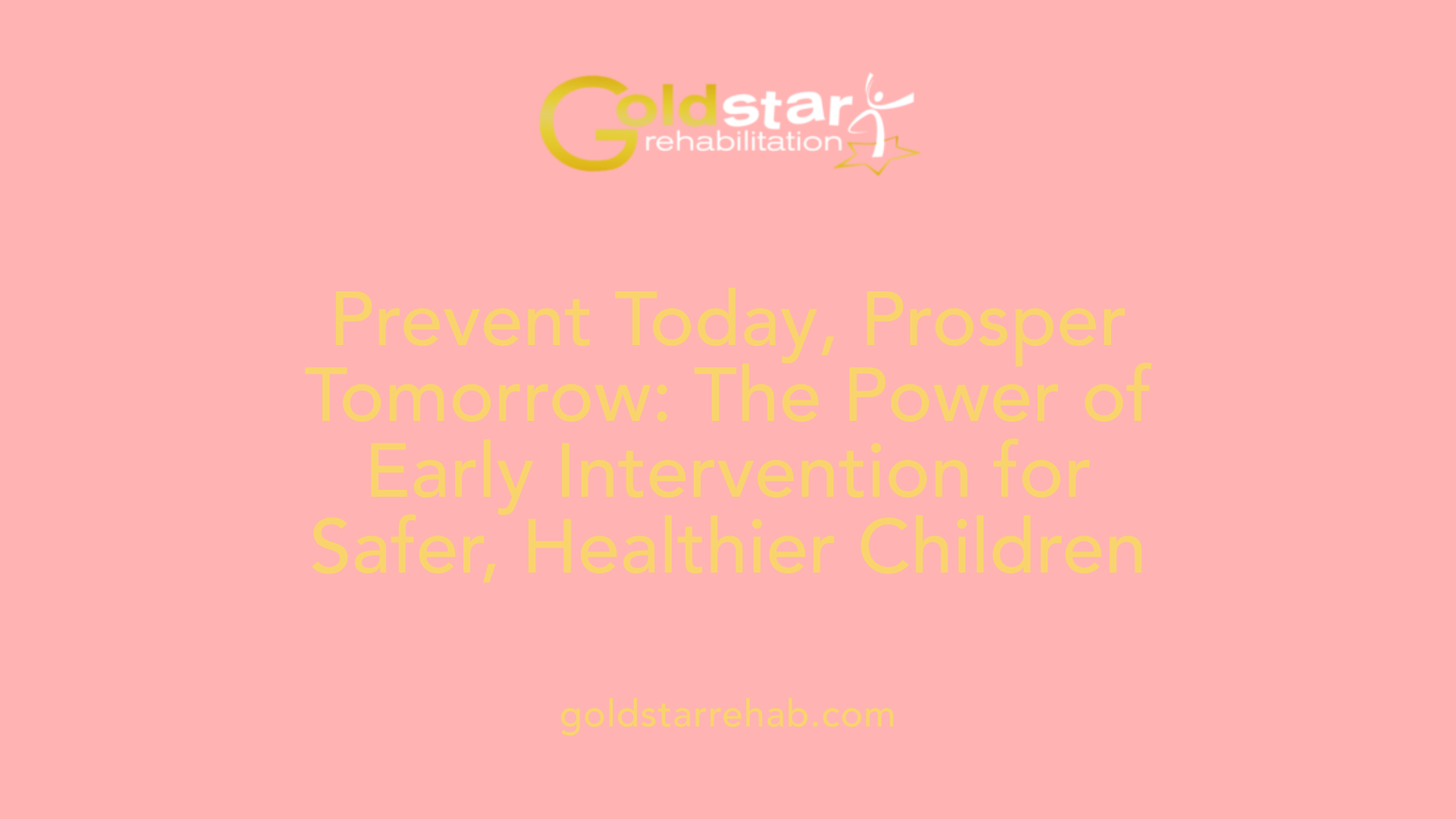
What is known about the effectiveness of early intervention programs in reducing aggressive behaviors in children?
Research consistently supports that early intervention strategies are effective in decreasing aggressive behaviors in children. These programs, whether universal or targeted, have demonstrated positive outcomes through various studies. School-based programs rooted in theoretical frameworks and tested via randomized controlled trials have shown modest yet significant reductions in aggression, with effect sizes around 0.20 to 0.30.
Family-focused therapies, such as Parent Management Training (PMT) and programs adapted from Parent-Child Interaction Therapy, have been associated with large and sustained improvements, notably in reducing youth-to-parent aggression and improving overall family dynamics. Interventions that develop emotional regulation, social problem-solving, and parenting skills contribute to long-term behavioral benefits.
Early interventions like parent training, classroom curricula, and community-based programs lead to a decline in oppositional and aggressive behaviors. These benefits are seen not only immediately but tend to persist over time, suggesting that early support can alter developmental trajectories.
Studies on in-home and community programs highlight that decreasing negative parenting practices and teaching children coping mechanisms can significantly reduce aggressive episodes, especially in infancy and early childhood.
Overall, accumulated evidence from randomized control trials and observational studies underscores that proactive, early strategies in addressing aggression are effective and essential for fostering safer, healthier developmental paths for children.
Benefits and Long-term Impacts
Implementing early intervention can have wide-ranging benefits. Children receiving these programs often show improvements in social skills, emotional regulation, and family relationships. These positive changes support better academic performance and peer interactions.
Long-term impacts include reduced risks of conduct problems, antisocial behavior, and mental health issues later in adolescence and adulthood. Early interventions can also prevent escalation of aggressive behaviors into more serious challenges, thereby decreasing future need for intensive treatment.
A robust body of evidence suggests that early handling of behavioral issues enhances resilience, improves coping strategies, and builds a foundation for healthier interpersonal dynamics. Moreover, these programs can result in significant resource savings by reducing the necessity for long-term clinical interventions.
Call for Policy and Practice Enhancement
Given strong evidence supporting early interventions, there is a pressing need to expand such programs through policy support and increased funding. Integrating evidence-based practices like parent training, social-emotional curricula, and family therapy into standard care can foster preventive mental health services.
Efforts should focus on increasing accessibility, culturally responsive adaptations, and ensuring sustainability of programs. Training professionals, engaging families, and embedding interventions within schools and community settings will maximize their reach.
By prioritizing early intervention, policymakers and practitioners can contribute to a future where children grow up in safer environments, with lower levels of aggression and higher emotional well-being. Investing now will build a stronger foundation for healthier, more resilient communities.
Stepping Towards a Safer, More Resilient Generation
Investing in early intervention for managing aggressive behaviors is not just a preventive measure, but a strategic approach to fostering healthier children, families, and communities. The wealth of evidence underscores that timely, tailored, and evidence-based strategies can lead to significant reductions in aggression, improved emotional regulation, and better developmental outcomes. As professionals and policymakers rally behind integrated programs that involve families, schools, and healthcare providers, we can pave the way for a future where childhood aggression is effectively managed, and children grow into well-adjusted adults equipped to contribute positively to society.
References
- Behavioral Interventions for Anger, Irritability, and Aggression in ...
- Early intervention can prevent behavior escalation
- Impact of Parenting Intervention on Observed Aggressive Behaviors ...
- The Importance of Early Intervention in Reducing Challenging ...
- Build Resilience: Early Intervention Transforms Child Mental Health
- What is early intervention?
- Preventing Children's Aggression: Outcomes of an Early Intervention
- 10 Effective Strategies to Handle Aggressive Behavior in Children
- Early Intervention Program in Youth-to-Parent Aggression: Clinically ...
- (PDF) Early Intervention Program in Youth-to-Parent Aggression
.png)








%20(1).jpg)




.jpg)





.jpg)

.jpg)











